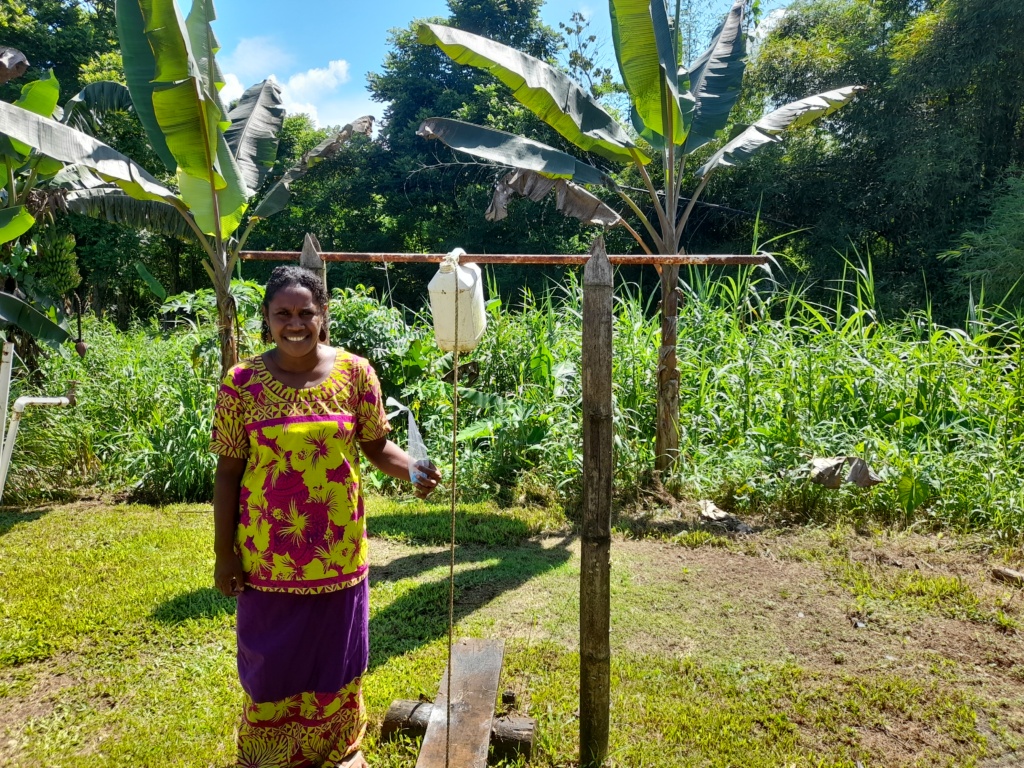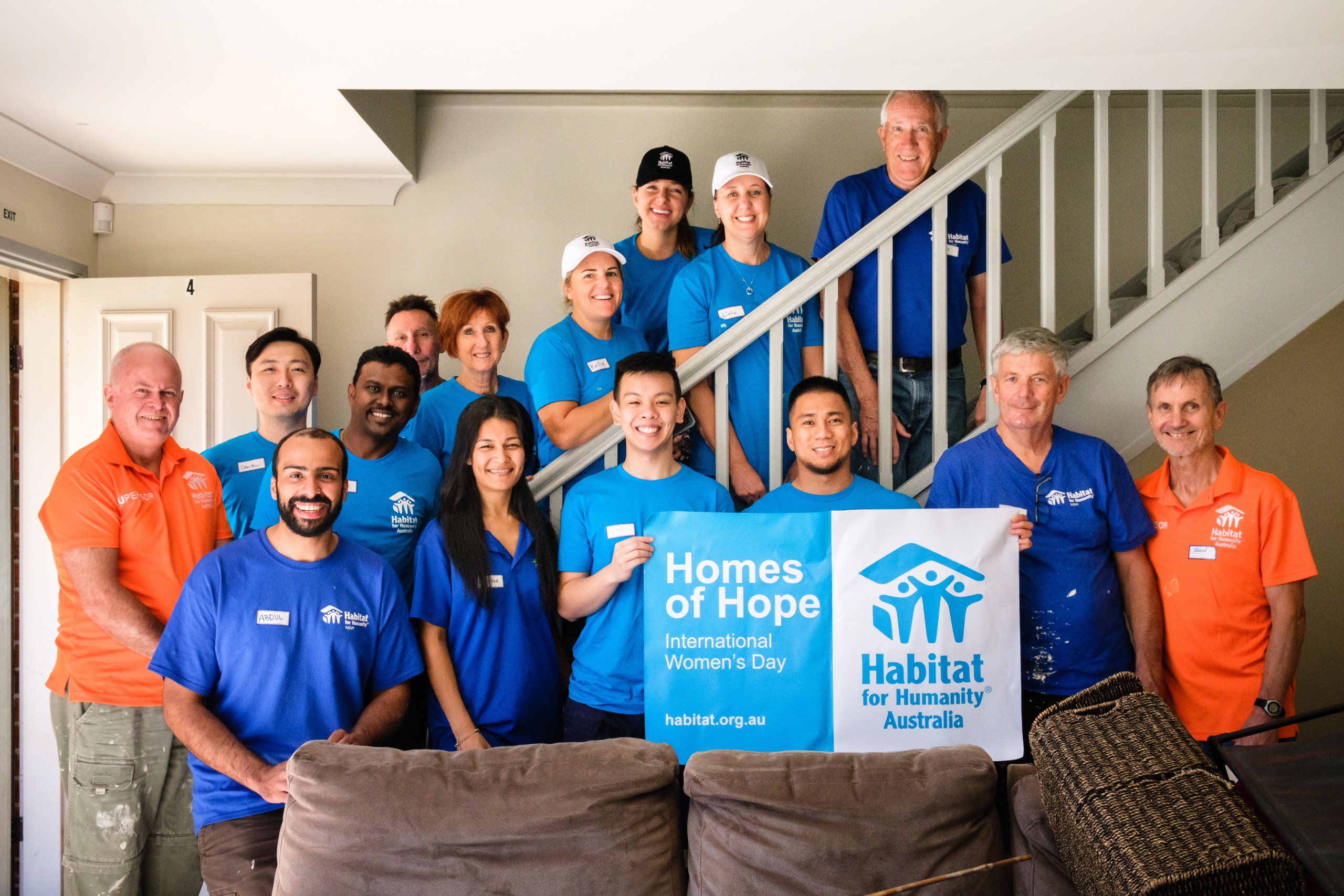Article by Lani.
At Habitat, we build strength, stability, and self-reliance through shelter. And one of our main goals? To empower women and children in need. Our programs both in Australia and overseas aim to support women in their endeavours to support themselves and their families through safe and secure housing.
Read about our top programs to help women and children in need and the stories of the lives we’ve changed below.
1. Refurbishing domestic violence transitional shelters and crisis accommodation
Habitat supports women and children who are experiencing domestic violence through refurbishing transitional shelters and crisis accommodation. Our Brush with Kindness program mobilises teams of volunteers to not only refurbish crisis accommodation but to conduct any landscaping and minor repairs to the homes’ exterior. Domestic violence is the leading cause of homelessness in Australia, and the work we do makes a world of difference to women and children experiencing this violence – even a fresh coat of paint or a good chat can help to make families feel valued, safe, and secure. Habitat also supports people who may be disadvantaged, disabled, or socially isolated to refurbish their crisis accommodation.

2. Supporting single mothers
Habitat helps single mothers to build safe and secure housing for themselves and their children through a designated program in Victoria and South Australia. Meet Christina, a single mother to three children. After a marital breakdown, Christina ended up in another relationship which turned abusive. For her own safety and the safety of her children, Christina left the relationship, and in doing so, also lost most of her life’s savings. She and her children were forced to move in with her ageing parents. Habitat was then able to step up and help Christina to build her very own home. Thanks to the support of donors and volunteers, Christina and her children now have a safe and decent home to live in. “It’s been amazing and changed our lives. We have somewhere to call home now. We were okay physically beforehand and now mentally we are so much happier.”
3. Supporting elderly and widowed women
One of our programs in Australia has the aim of providing temporary housing to elderly and widowed women who were affected by the bushfires. Elizabeth is one of those women. Elizabeth lost her home in the 2019 bushfires that spread through Balmoral in the Southern Highlands of NSW. After living in a tin shed, Habitat were able provide a demountable for Elizabeth, freshly painted and delivered on the back of a truck. Although the demountable is intended to be only temporary accommodation until she can rebuild, it’s got everything she needs for now – a large bed, kitchen, shower, and a toilet. But for Elizabeth, it wasn’t just demountable that made a difference – she also highly praised the hard-working volunteers who became friendly faces and a welcome distraction through these tough times.
4. Supporting women overseas
Overseas, Habitat supports women through our home building program. One of the women we’ve helped is Elisabet Yunita Ivani. Elisabet’s house in her village in Indonesia was an old cattle pen. It would flood easily, and she would have to wake up in the middle of the night to drain it out. It didn’t have a toilet, which was especially hard for Elisabet following the birth of her child. But with Habitat’s help, Elisabet’s family was able to build a house with access to clean water and a working toilet, which made a massive difference to her family’s health and wellbeing. Habitat also helped Elisabet to learn about saving money and budgeting. “From being a farm labourer, I am now a farmer, which is quite an improvement for me. I’m saving money to put my son through school. I want him to get the highest possible educational attainment so he can make his own fortune and build his own house”, she said. The power and stability that comes with having a decent place to live and basic financial knowledge means that people like Elisabet can now rely on themselves for a better future.
5. Training and education
Habitat also supports women overseas through running training and education courses on things like microfinance, business, home loans, sanitation, and hygiene. One of the women that Habitat was able to help through economic empowerment training is Adawiah. Adawiah had always wanted to open her own business, but never had the money or resources. Habitat trained Adawiah and her community members in Indonesia about light food processing and basic marketing to support small household businesses. “Maybe now I can apply everything that I have learnt from the economic empowerment training to achieve my dreams”, said Adawiah. The ability to manage finances allows women and their families to achieve stability and take control of their future.

6. Water for Women program
We support the Water for Women project in Fiji to teach people about the importance of hygiene and handwashing. Habitat works with change agents like front-line workers and community workers to promote health, resilience, and inclusion – vital lessons in the midst of the COVID-19 pandemic. One front-line worker in Malevu, Mere Raika, was part of our Water, Sanitation and Hygiene training. Since the training, Mere has taught her family and community about the importance of handwashing, sharing this valuable message through Sunday School lessons, village meetings and women’s groups. Mere told us that since the training, she now sees both adults and children washing their hands after toileting and eating. So far, the Water for Women program has been registered in 18 communities and 11 schools within the Ba and Ra provinces in Fiji. Not only is this program making people safer, but it’s also saving lives. The Water for Women Project is in partnership with Australian Government (DFAT), Water for WOmen, and our implementing partner Habitat for Humanity Fiji.
7. International Women’s Day
On International Women’s Day in 2020 as part of our annual Homes of Hope program, Habitat for Humanity mobilised 463 corporate volunteers from 22 companies to renovate women’s crisis accommodation and build homes for vulnerable women in Australia. Many of these women were experiencing homelessness due to family and domestic violence. In Australia, 1 in 4 women have experienced physical and/or emotional abuse at the hands of an intimate partner, and over 82% of single parents are female. With the pressures of raising a family and earning an income falling on the shoulders of single mothers, providing a hand up on International Women’s Day can make a world of difference. Although we’ve had to put our International Women’s Day plans on hold during 2021 due to the COVID-19 pandemic, we can’t wait to sign up plenty more corporate volunteers next year to support women’s shelters through painting and refurbishment.
Click here to donate: https://www.habitat.org.au/donate
Volunteer: https://helpinghands.online/


